Sustainable Environment
UVB adheres to its core values of cultivating virtue, caring for people and striving for excellence. While pursuing corporate growth, we are also concerned about the natural environment and local communities. Our daily operations at the headquarters and our stores adhere to the United Nations Sustainable Development Goals (SDGs), such as SDG 7 (Affordable and Clean Energy), SDG 8 (Decent Work and Economic Growth), SDG 12 (Responsible Consumption and Production), SDG 13 (Climate Action), and SDG 17 (Partnerships for the Goals). Through green procurement, waste reduction, improved energy efficiency, greenhouse gas inventory, and setting reduction targets, we work alongside suppliers to achieve environmental sustainability.
UVB has no manufacturing and production activities, and is not an energy-intensive and major energy-consuming industry. It is not a source of greenhouse gas emissions that shall be regulated by the Ministry of Environment of the Executive Yuan, and is therefore at low risk of being regulated by the "Climate Change Response Act" and other relevant laws and regulations.
However, as climate change has become a global challenge, mitigating the impact of climate change is a matter of great urgency. UVB continues to focus on the changes in relevant domestic and international regulations and actively conducts greenhouse gas inventory, emission control and implements energy-saving and carbon-reduction policies in order to fulfill its corporate responsibilities and obligations in environmental protection.
Energy Management
UVB actively addresses global climate change issues, prioritizes energy management, responds to government environmental protection and energy-saving policies, and implements energy-saving and carbon reduction measures in order to enhance energy efficiency and control as well as reduce greenhouse gas emissions. Currently, all energy is from non-renewable sources; no renewable energy is used as of now. Total energy consumption of the headquarters and branch offices is as follows:
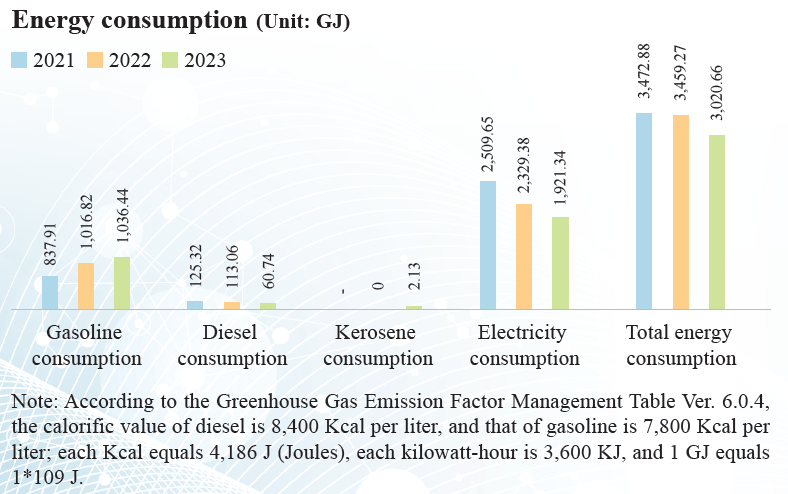 Note: The above statistics are only for the parent company.
Note: The above statistics are only for the parent company.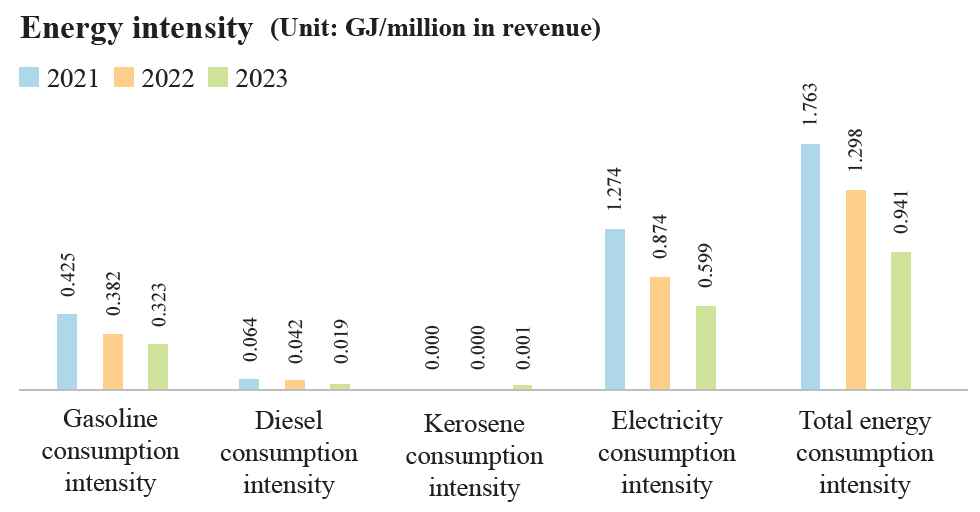 Note: The above statistics are only for the parent company.Energy-saving and carbon reduction measures
Note: The above statistics are only for the parent company.Energy-saving and carbon reduction measures 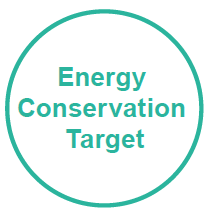
Continuously improve the lamps and air conditioners used in all stores, adopt energy-saving LED lamps and inverter air-conditioning equipment, and actively educate company personnel to develop behaviors that are more friendly to the environment.In the future, the Company plans to promote "green purchasing" and give priority to the purchase of products with green labels (environmental label, energy saving label, water saving label, carbon footprint label, etc.).
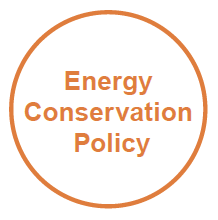
Offices are required to turn off the lights during lunch breaks and turn off the lights and air-conditioners after getting off work.
Enforcing the energy conservation advocacy and all members engage in energy-saving activities to reduce unnecessary energy waste.
Energy-saving lamps and energy-saving equipment are adopted in the main passage areas while lighting is turned off in areas not in operation.
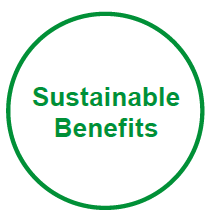
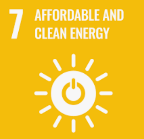 SDGs 7: Affordable and Clean Energy
SDGs 7: Affordable and Clean Energy 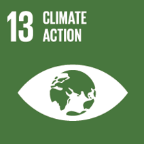 SDGs 13: Climate Action
SDGs 13: Climate ActionInvestment in energy-saving equipment
In recent years, UVB has continued to promote green procurement, prioritizing products with green product labels (environmental protection, energy-saving, water-saving, and carbon footprint labels).Every year, investments are made in energy-saving equipment, including all models of Fujitsu inverter air conditioners, which have obtained Registration of Product Certificates and Fujitsu VRF Electric Testing Report from the Taiwan Electric Research and Testing Center, complying with the Ministry of Economic Affairs’ requirements for safety and energy-saving labels for manufacturers and equipment. Calculations are based on: 10 pings (approx. 33 square meters) of space, 2,486 hours of annual air conditioner operation, electricity cost at NTD 4 per kWh, with 1 kWh emitting 0.494 kg CO2; the energy-saving efficiency of Fujitsu VRF equipment per 10 pings:
◆ Annual energy savings (KWH) (compared to non-certified models): 548~716
◆ Annual cost savings (NTD) (compared to models with no environmental label): 2,092-2,864
◆ Reduction in CO2 emissions (kg) (compared to models with no environmental label): 270.71-353.70
The total investment in energy-saving equipment for 2023 amounted to NTD 21,071,000, which reflects a year-on-year decrease in total electricity consumption and intensity from 2021 to 2023.The following are the amounts invested in energy-saving equipment over the past three years:
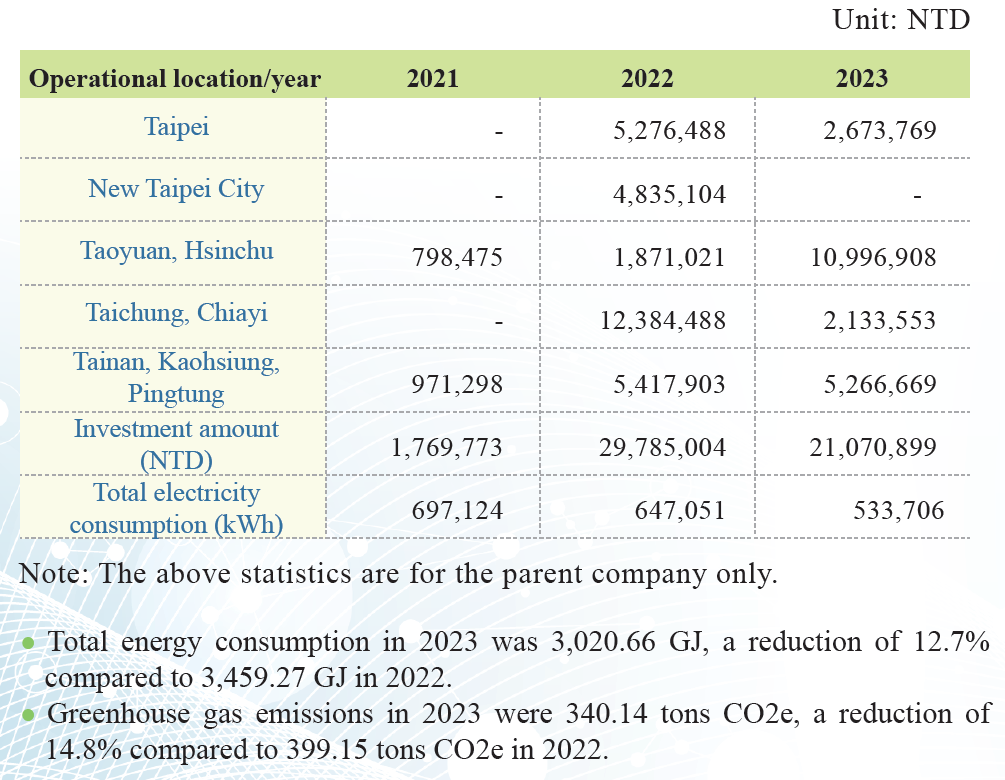
Greenhouse Gas Emissions
Extreme weather caused by greenhouse gases is a critical global environmental issue. UVB’s Scope 1 greenhouse gas emissions are based on the fuel consumption (liters) of company vehicles, while Scope 2 emissions are based on electricity consumption from Taiwan Power Company. UVB calculates greenhouse gas emissions through self-management, allowing for early detection of trends and proactive responses. From 2021 to 2023, UVB’s greenhouse gas inventory boundary covered the Company’s headquarters in Nangang and all branch offices and stores. Emission calculations were based on the emission factors for electricity announced by the Taiwan Power Company and the emission factors for fuel oil announced by the Ministry of Environment, with the total emissions calculated as follows:
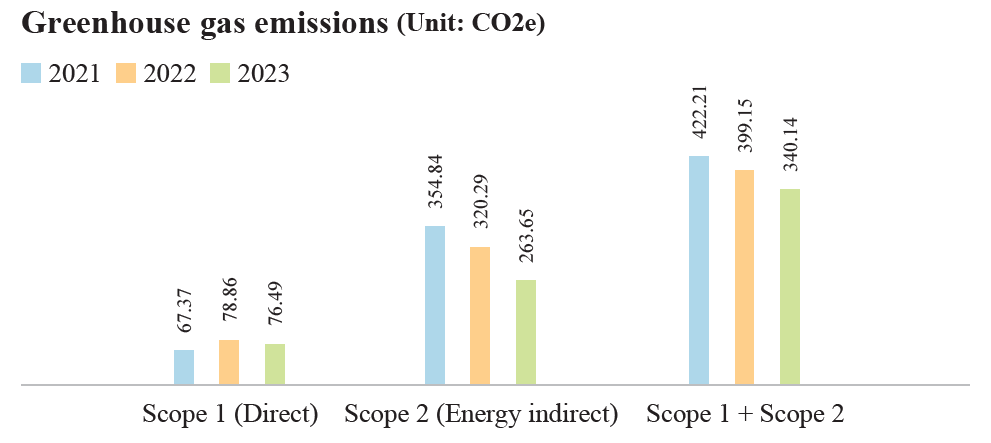
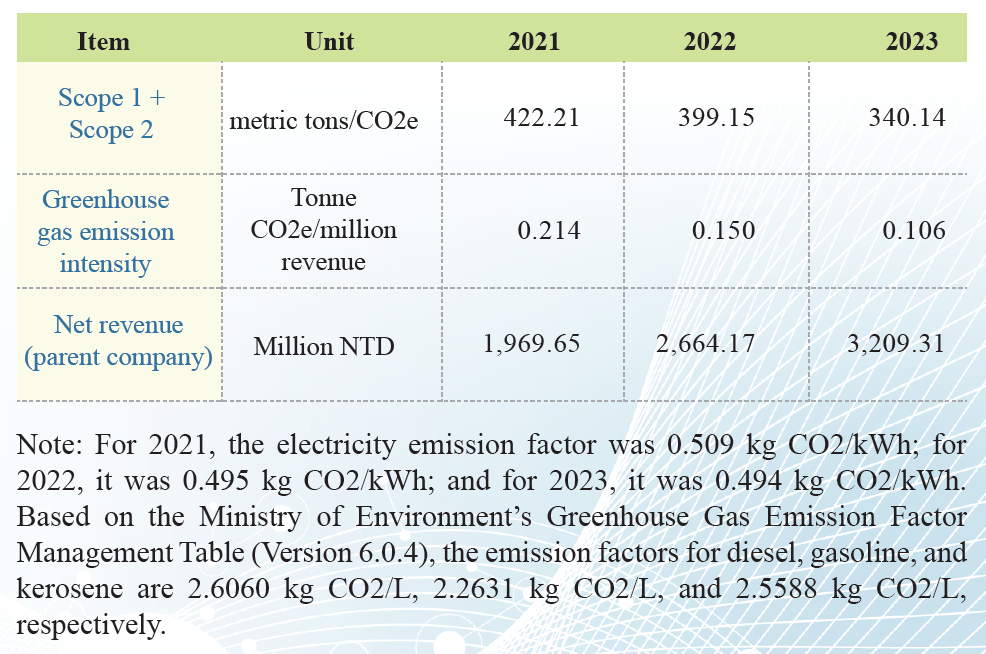 Policies for Climate Change or Greenhouse Gas Management
Policies for Climate Change or Greenhouse Gas ManagementUVB’s greenhouse gas emissions are mainly indirect emissions, and the emission sources mainly come from the electricity required for air conditioning, equipment, and lighting. The impact of climate change on the global environment is becoming increasingly significant. The Company complies with environmental protection laws and regulations, continues to promote energy conservation and carbon reduction measures, operates sustainably, and fulfills its corporate responsibilities. The specific action plan is as follows:
- 1. Promote and implement energy conservation and carbon reduction measures, and communicate policies to employees, suppliers, customers, and other stakeholders.
- 2. Strengthen advocacy and encourage all employees to develop the habit of saving energy and resources.
- 3. Turn off lighting equipment in vacant areas in a timely manner and turn off lights in office areas during lunch breaks to save energy.
- 4. Establish an electronic form system to reduce paper usage.
- 5. Promote company car sharing to reduce the number of vehicle trips and reduce fuel consumption.
- 6. Establish a greenhouse gas emission inventory, carry out regular inventory inspections, and control emissions.
- 7. The air-conditioning systems in stores will be replaced with new ones, and 60% of the air-conditioning equipment will be replaced with energy-efficiency Level 1 products.
- 8. Plan and build an energy monitoring system and respond by using digital management to strengthen energy efficiency and energy-saving plan.
Water Resources Management
UVB places great importance on water resource management. However, as the Company is not in the manufacturing sector, there is no wastewater discharge from production processes or laboratories. The water intake at its Nangang headquarters, branch offices and stores is relatively low, with no significant ecological impact on water resources.
Water consumption data from 2021 to 2023 is explained as follows:
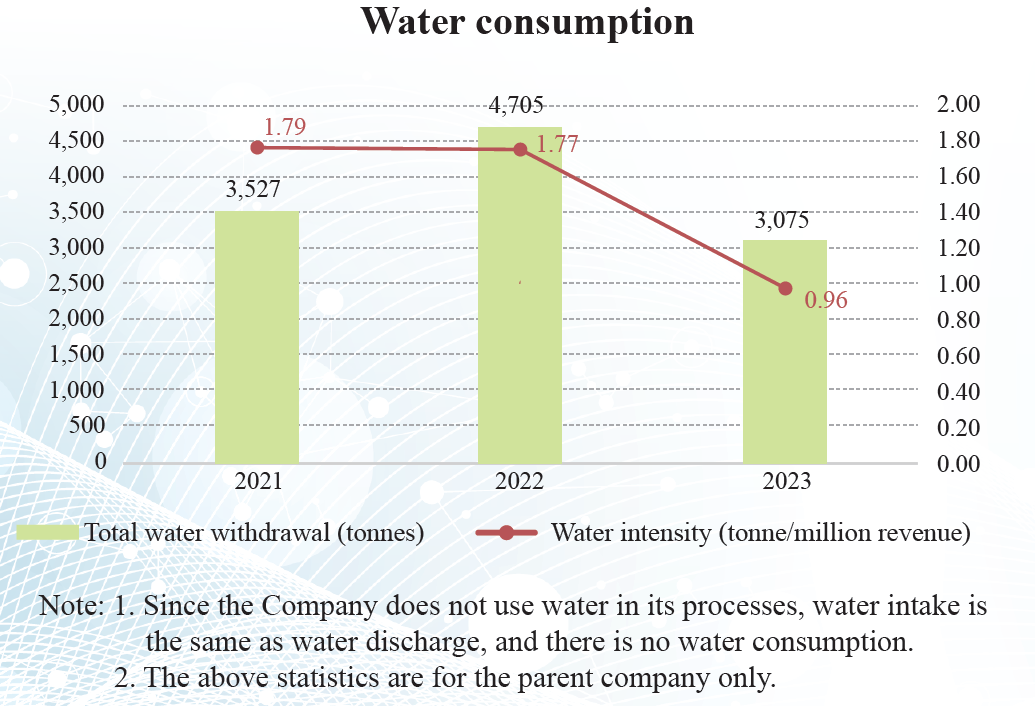
Quantitative management goals for greenhouse gas reduction and water reduction
UVB uses 2020 as the base year to set a quantitative management goal of a 5% annual reduction in greenhouse gas emissions and water consumption from 2021 to 2023.
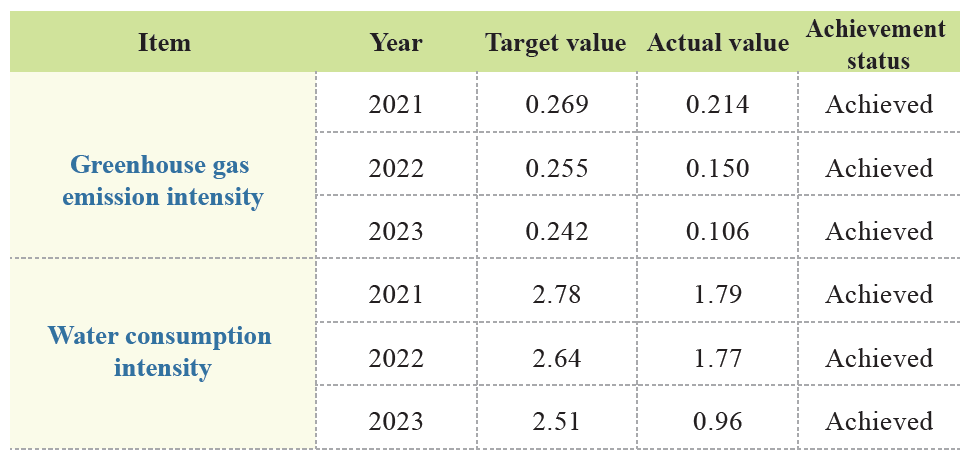 Note: The above statistics are for the parent company only.
Note: The above statistics are for the parent company only.Waste Management
UVB is committed to the sustainable operation of the enterprise, and continuously strives to reduce the possible impact of waste on the environment. Through various voluntary actions, it avoids excessive packaging of products and jointly implements the responsibility of being environmentally friendly.
UVB advocates convenient and paperless services such as online trading platforms and electronic payment to effectively reduce the energy consumption of customers' round-trip transportation and the use of paper. Fulfill corporate social responsibility.
Waste management policy| Paper conservation | ◆Promoting the use of online transaction platforms, electronic payments, and other convenient, paperless services. ◆Introducing digital forms and processes within the Company to reduce the use of paper and toner. ◆Using 70P paper, encouraging double-sided printing, and setting up waste paper recycling bins. |
| Reducing e-commerce packaging | ◆In response to the Ministry of Environment’s regulations on “Online Shopping Packaging Restrictions and Implementation Methods”, which were enacted in July 2023, we conducted an inventory of e-commerce packaging materials and methods from July to December 2023, all of which complied with the standards. ◆For 2024, we plan to recycle packaging originally used in stores to be used for e-commerce shipments to reach our targets in reducing packaging materials. |
| Statistics on Waste | ◆General household waste from the headquarters, branch offices and stores is managed by the building management committee and cannot be effectively calculated; therefore, the total weight of waste cannot be provided. ◆The Company is not in the manufacturing sector. Therefore, we are not required to report regulated hazardous waste and non-hazardous waste. We consolidate statistics on product waste, handling product scrapping twice a year, and implement volume control measures. |
 Note: The above statistics are for the parent company only.
Note: The above statistics are for the parent company only.